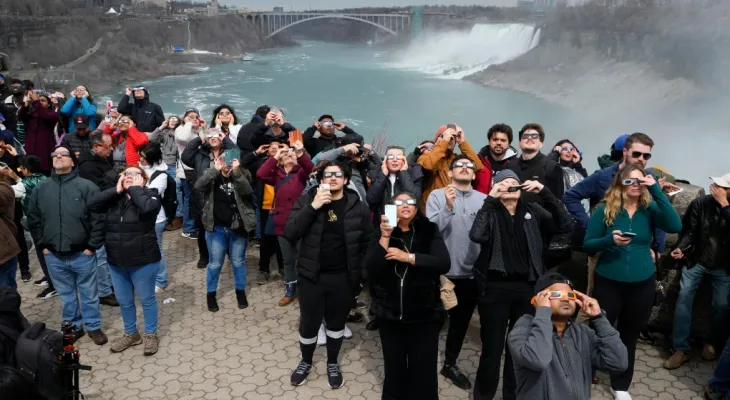Search here
Newspaper
Search here

Arab Canada News
News

Published: April 10, 2024
The mayor of Niagara Falls said there are two things standing in the way of the expected gathering of a million people in the city to watch the eclipse on Monday: bad weather and the state of emergency declared by the region.
City Mayor Jim Diodati told CTV News Toronto in an interview on Tuesday: "They don't want to bring their families to an area if a state of emergency is declared," saying the decision made last month had a "big downward push" on attendance.
He added, "More than 200,000 people attended to watch this rare celestial event, but that represents only a fifth of the crowd the city was expecting."
Due to its location in the path of the total eclipse, Niagara Falls was nicknamed one of the best places in the world to watch the eclipse.
Facing the potential record number of visitors, the Niagara region declared a state of emergency on March 29 "out of an abundance of caution."
The region said at the time that the decision, taken under the Emergency Management and Civil Protection Act (EMCPA), would enhance the "tools" available to it and "protect the health and safety of residents and visitors, as well as protect critical infrastructure in any scenario that may arise."
This measure was lifted Monday afternoon after the eclipse event ended "without any incident."
However, Diodati said this step "really hindered attendance" in a city that needs tourists after four years of the COVID-19 pandemic outbreak.
He added, "You can't put toothpaste back in the tube. The decision was made out of an abundance of caution. I understand the rationale. I don't necessarily agree with it. But here we are.”
The announcement is also the subject of a legal challenge by the Canadian Constitution Foundation, which claimed this step was "illegal" because it did not meet the legal definition of "emergency" under the EMCPA.
Was the state of emergency declaration necessary?
While there wasn't much Niagara Falls could do about the rolling clouds that covered most of the sky on Monday, Diodati believes it could have hosted the eclipse event without the state of emergency.
He said, "Oh yes. We were ready. This is what we do in Niagara Falls. We host major events, and we do it all the time."
"Obviously having more hands on deck is better, and obviously we were more prepared than necessary. I’d rather be overly prepared than underprepared, but we would certainly be in a good place without the state of emergency.
Overall, Diodati said the event went smoothly, and although it is too early to measure the real economic impact, he said restaurants, hotels, and tourist attractions “were packed.”
In addition to the operational success of the event, wired and wireless communications in both Niagara Falls and Niagara-on-the-Lake were largely unaffected by the surge in visitors after both cities warned of potential drops in mobile reception.
On Tuesday, BCE Inc. said its Bell network saw five times the normal traffic volume in cities across southern and eastern Ontario, including Niagara, while Rogers Communications Inc. said it experienced six times the normal network load in Niagara Falls alone.
The two companies said their networks were ready for the traffic and continued to operate optimally, partly due to portable cell towers deployed in the area to increase capacity.
The companies also temporarily halted routine maintenance work that could have reduced service levels
Comments